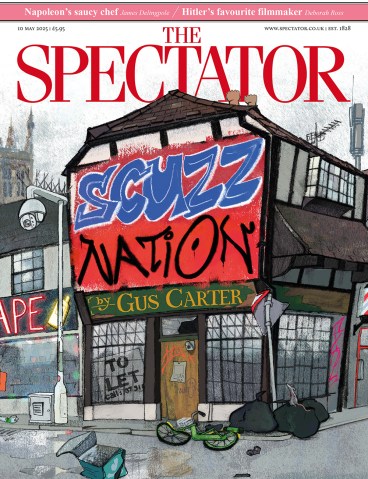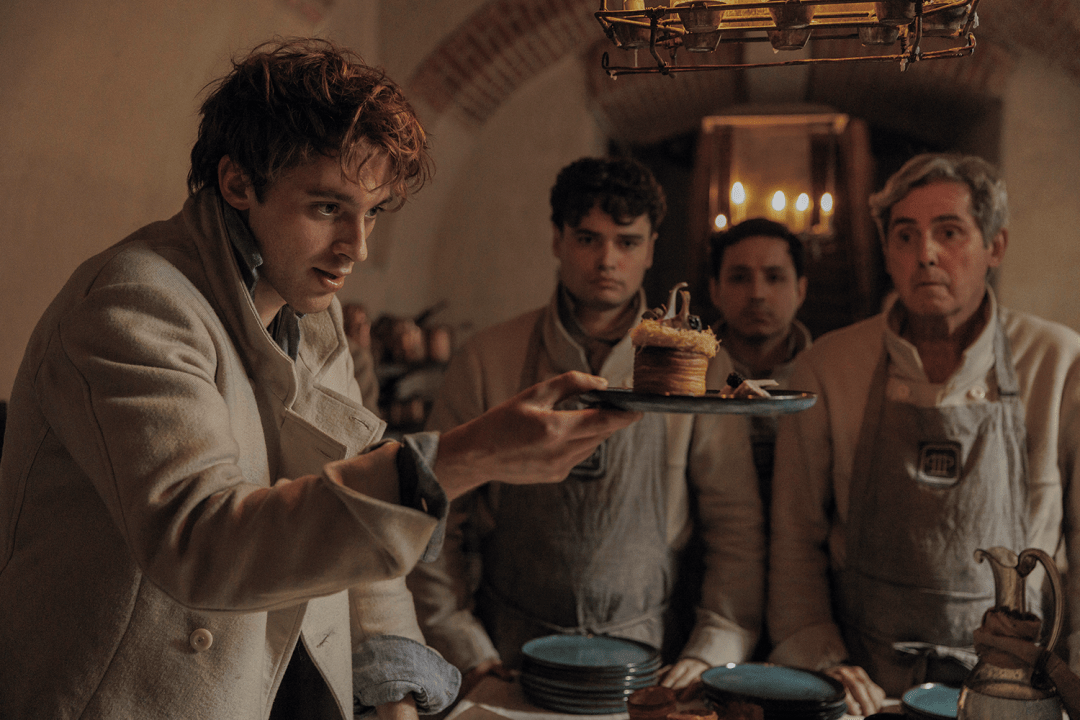
James Delingpole has narrated this article for you to listen to.
Antonin Carême was known as the ‘chef of kings and the king of chefs’. His patrons and employers included Talleyrand, Napoleon, the Prince Regent, Tsar Alexander and the then richest man in France, James Rothschild. He popularised the tall ‘toque’ hat worn by chefs; he either invented or perfected culinary classics including the vol-au-vent, the profiterole and the mille-feuille, as well as sauces including velouté and béchamel. All this he managed to achieve despite having come from a desperately poor background, raised in a shack in revolutionary France and sent off as a young lad to help make ends meet as a kitchen boy and later as apprentice to Paris’s best patissier.
A fascinating rags to riches story, you might think. But it’s not one that the new Apple TV+ series Carême is much interested in telling. ‘It is obvious when you watch it that it is not a documentary,’ says Ian Kelly, who helped adapt the screenplay from his 2003 biography Cooking For Kings. Oh, indeed it is. So many liberties does this seamy potboiler take with the chef’s biography, so many implausibilities does it rudely thrust into Carême’s lived experience, that by the end of the first episode I wondered if a single detail was accurate. I almost began to doubt whether he’d even been a chef.
Take, for example, its portrayal of his relationship with Napoleon. In real life, this consisted of his being asked to cook at Napoleon’s wedding to his second wife, Marie Louise of Austria in 1810. But in the TV version, they meet in the 1790s, when Napoleon – then only First Consul – almost dies as a result of an overexuberant bout of shagging. Luckily, Napoleon’s quick-witted black servant thinks to summon Carême, having somehow intuited correctly that the chef will whip up a herbal potion on the spot that will magically revive the future emperor.
As a result of this fantastical event, which never happened – not in a million years – Napoleon is understandably anxious to secure Carême’s services as a chef. When Carême refuses, Napoleon has him arrested on trumped up charges but not before Carême has grasped that he should seek out a mysterious man named Talleyrand. Using his renowned savoir-faire and insight, Talleyrand treats Carême to some choice advice, befitting his many years as a top negotiator and diplomat: Carême should go and work for Napoleon.
Some of the dimmer viewers might well not have heard of this Talleyrand bloke. But fear not. Tallyrand is here to help. Almost the first things he asks Carême is: ‘What do you know about me?’ This gives Carême the perfect opportunity to fill us in on the details. And very soon, we will see Tallyrand’s legendary scheming skills in action for ourselves: show, not tell, don’t you know?
This is so bad it might as well be American and on Netflix
This occurs during yet another deeply plausible scene in which Talleyrand, cunning old club-footed diplomat clergyman that he is, persuades Carême to sneak into Napoleon’s private apartment and copy a map of the route his carriage will be taking in a few days. Carême achieves this by, first, administering oral sex to Josephine’s lady-in-waiting, and then, by reducing Josephine herself almost to the point of orgasm with his delicious vol-au-vents. You fear he might end up having sex with her too, but it’s OK, you’re safe. The vol-au-vents are drugged, so all he does is put her to sleep – but not, apparently, in such a way as she minds or that there are any comebacks.
I could go on but I think you get the idea. Perhaps the Bridgerton crowd will enjoy this confection of sex, bad history and nonsense but to me it’s just an opportunity wasted. Usually, the great relief with foreign-language drama is that it hasn’t yet succumbed to annoyances like diversity casting, anachronistic haircuts and intelligence-insulting plot lines. But this is so bad it might as well be American and on Netflix. Still, the food looks good and Benjamin Voisin makes a handsome, dashing Carême. And I guess I’m quite looking forward to the inevitable scene where Carême turns the course of the Battle of Waterloo by delaying the arrival of the Prussians by covering their path with exquisitely crafted lengths of blancmange shaped to look like frankfurters.
Chef’s Table: Legends might be better if it weren’t so stiltedly hagiographical and earnest. I watched the episode on Alice Waters, whose Berkeley, California, restaurant Chez Panisse pioneered the farm-to-fork movement, which places more emphasis on the sourcing of ingredients than it does on technique. So when you go there (it costs around $175 per head), is it mainly for the warm glow of smug worthiness you get from chomping through the choicest, handpicked vegetables, prettily arranged, or is there any actual value added by the chefs? I was quite curious to know but the documentary was more interested in telling us how Waters had changed the eating habits of America, which I’m not altogether convinced – barring that of the odd Silicon Valley tech billionaire – she really has.









Comments